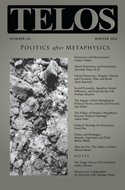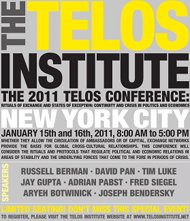By Adrian Pabst · Thursday, January 31, 2013 Adrian Pabst’s “The Politics of Paradox: Metaphysics beyond ‘Political Ontology'” appears in Telos 161 (Winter 2012). Read the full version online at the Telos Online website, or purchase a print copy of the issue in our store.
 Since the onset of the Enlightenment, much of modern thought has celebrated the end of metaphysics and the death of God. The project of “political ontology,” which combines post-metaphysical with post-theistic thinking, underpins the scientific rationalism that pervades contemporary philosophy and politics. Faced with the secular slide into skepticism, relativism, and nihilism, this essay argues that the only genuine alternative to “political ontology” is a metaphysical politics of paradox. Philosophically, modernity and postmodernity invented and intensified the onto-theological science of transcendental ontology that can be traced to Scotus, Ockham, Machiavelli, and Suárez. They bequeathed three currents—possibilism, transcendentalism, and absolutism—that flow through figures such as Descartes, Wolff, and Clauberg to Kant, Hegel, and Comte. Since the onset of the Enlightenment, much of modern thought has celebrated the end of metaphysics and the death of God. The project of “political ontology,” which combines post-metaphysical with post-theistic thinking, underpins the scientific rationalism that pervades contemporary philosophy and politics. Faced with the secular slide into skepticism, relativism, and nihilism, this essay argues that the only genuine alternative to “political ontology” is a metaphysical politics of paradox. Philosophically, modernity and postmodernity invented and intensified the onto-theological science of transcendental ontology that can be traced to Scotus, Ockham, Machiavelli, and Suárez. They bequeathed three currents—possibilism, transcendentalism, and absolutism—that flow through figures such as Descartes, Wolff, and Clauberg to Kant, Hegel, and Comte.
Continue reading →
By Adrian Pabst · Thursday, March 29, 2012 At the ABC (Australia) Religion & Ethics website, Telos Associate Editor Adrian Pabst recently discussed the crisis of global capitalism, Pope Benedict’s vision of a civil economy, and the possibilities of a Catholic Christian “third way”:
The year 2011 witnessed a new wave of protest movements and unprecedented popular outrage across the globe. From the protests in North Africa and the Middle East to the Occupy Wall Street movement in the United States to the camps outside St Paul’s Cathedral in London and Moscow, demonstrators have expressed a deep-seated anger at global finance that is shared by many.
Continue reading →
By Adrian Pabst · Monday, November 21, 2011 SAVE THE DATE!
The West: Its Legacy and Future
September 7–10, 2012
L’Aquila, Italy
Recent developments appear to end the “end of history” and foreshadow instead the end of the West. After 1989, many expected a gradual convergence toward Western models of liberal market democracy. But Western responses to 9/11 and the 2007–8 transatlantic “credit crunch” have exposed the limits of U.S. international primacy and accelerated the global shift of power from West to East and North to South—as evinced by the rise of China, India, and other emerging markets.
Politically and economically, that shift seems to portend the emergence of a post-American and perhaps even a post-Western world. Yet the United States is still the default superpower whose military might and economic energy ensure its pre-eminence for the foreseeable future. Likewise, Europe’s institutions, culture, and way of life remain attractive across the globe. Even the near meltdown of Wall Street and the mishandling of the sovereign debt crisis have so far not led to a decoupling of the rest from the West.
Continue reading →
By Adrian Pabst · Wednesday, March 9, 2011 This paper was presented at the 2011 Telos Conference, “Rituals of Exchange and States of Exception: Continuity and Crisis in Politics and Economics.”
 For Max Weber, the spirit of capitalism is best understood in terms of Calvinist divine predestination. But by focusing on the Protestant work ethic, Weber’s thesis about the origins of modern capitalism is at once too broad and too narrow. Too narrow because he neglects the counter-Reformation Baroque scholasticism of influential Catholic theologians like Francisco Suárez that sunders “pure nature” from the supernatural and thus divorces man’s natural end from his supernatural finality. As a result, human activity in the economy is separated from divine deification and the market is seen as increasingly autonomous. In short, human contract is severed from divine gift. For Max Weber, the spirit of capitalism is best understood in terms of Calvinist divine predestination. But by focusing on the Protestant work ethic, Weber’s thesis about the origins of modern capitalism is at once too broad and too narrow. Too narrow because he neglects the counter-Reformation Baroque scholasticism of influential Catholic theologians like Francisco Suárez that sunders “pure nature” from the supernatural and thus divorces man’s natural end from his supernatural finality. As a result, human activity in the economy is separated from divine deification and the market is seen as increasingly autonomous. In short, human contract is severed from divine gift.
Continue reading →
By Adrian Pabst · Tuesday, August 17, 2010 The ongoing debate about budget deficits, public debt, and the case for or against austerity reflects old ideological disagreements that ignore the new realities of late-modern capitalism. Both left and right rehash virtually the same arguments since Reagan and Thatcher, but lack the imagination for genuinely fresh ideas and transformative policies.
Continue reading →
By Adrian Pabst · Friday, April 16, 2010  Saturday’s airplane crash killing Poland’s president, Lech Kaczyński, alongside more than ninety other Polish senior civilian (and military) figures happened in Smolensk, near Katyn—the same site where more than 20,000 Polish prisoners of war were murdered by the Soviet secret police NKVD in 1940 on Stalin’s orders, as Victor Zaslavsky’s Class Cleansing: The Massacre at Katyn, published by Telos Press, vividly documents. But last week’s tragedy is no “second Katyn”—contrary to what liberal commentators such as Timothy Garton-Ash would have us believe. Saturday’s airplane crash killing Poland’s president, Lech Kaczyński, alongside more than ninety other Polish senior civilian (and military) figures happened in Smolensk, near Katyn—the same site where more than 20,000 Polish prisoners of war were murdered by the Soviet secret police NKVD in 1940 on Stalin’s orders, as Victor Zaslavsky’s Class Cleansing: The Massacre at Katyn, published by Telos Press, vividly documents. But last week’s tragedy is no “second Katyn”—contrary to what liberal commentators such as Timothy Garton-Ash would have us believe.
Continue reading →
|
|
 Since the onset of the Enlightenment, much of modern thought has celebrated the end of metaphysics and the death of God. The project of “political ontology,” which combines post-metaphysical with post-theistic thinking, underpins the scientific rationalism that pervades contemporary philosophy and politics. Faced with the secular slide into skepticism, relativism, and nihilism, this essay argues that the only genuine alternative to “political ontology” is a metaphysical politics of paradox. Philosophically, modernity and postmodernity invented and intensified the onto-theological science of transcendental ontology that can be traced to Scotus, Ockham, Machiavelli, and Suárez. They bequeathed three currents—possibilism, transcendentalism, and absolutism—that flow through figures such as Descartes, Wolff, and Clauberg to Kant, Hegel, and Comte.
Since the onset of the Enlightenment, much of modern thought has celebrated the end of metaphysics and the death of God. The project of “political ontology,” which combines post-metaphysical with post-theistic thinking, underpins the scientific rationalism that pervades contemporary philosophy and politics. Faced with the secular slide into skepticism, relativism, and nihilism, this essay argues that the only genuine alternative to “political ontology” is a metaphysical politics of paradox. Philosophically, modernity and postmodernity invented and intensified the onto-theological science of transcendental ontology that can be traced to Scotus, Ockham, Machiavelli, and Suárez. They bequeathed three currents—possibilism, transcendentalism, and absolutism—that flow through figures such as Descartes, Wolff, and Clauberg to Kant, Hegel, and Comte.  For Max Weber, the spirit of capitalism is best understood in terms of Calvinist divine predestination. But by focusing on the Protestant work ethic, Weber’s thesis about the origins of modern capitalism is at once too broad and too narrow. Too narrow because he neglects the counter-Reformation Baroque scholasticism of influential Catholic theologians like Francisco Suárez that sunders “pure nature” from the supernatural and thus divorces man’s natural end from his supernatural finality. As a result, human activity in the economy is separated from divine deification and the market is seen as increasingly autonomous. In short, human contract is severed from divine gift.
For Max Weber, the spirit of capitalism is best understood in terms of Calvinist divine predestination. But by focusing on the Protestant work ethic, Weber’s thesis about the origins of modern capitalism is at once too broad and too narrow. Too narrow because he neglects the counter-Reformation Baroque scholasticism of influential Catholic theologians like Francisco Suárez that sunders “pure nature” from the supernatural and thus divorces man’s natural end from his supernatural finality. As a result, human activity in the economy is separated from divine deification and the market is seen as increasingly autonomous. In short, human contract is severed from divine gift.  Saturday’s airplane crash killing Poland’s president, Lech Kaczyński, alongside more than ninety other Polish senior civilian (and military) figures happened in Smolensk, near Katyn—the same site where more than 20,000 Polish prisoners of war were murdered by the Soviet secret police NKVD in 1940 on Stalin’s orders, as Victor Zaslavsky’s
Saturday’s airplane crash killing Poland’s president, Lech Kaczyński, alongside more than ninety other Polish senior civilian (and military) figures happened in Smolensk, near Katyn—the same site where more than 20,000 Polish prisoners of war were murdered by the Soviet secret police NKVD in 1940 on Stalin’s orders, as Victor Zaslavsky’s 

